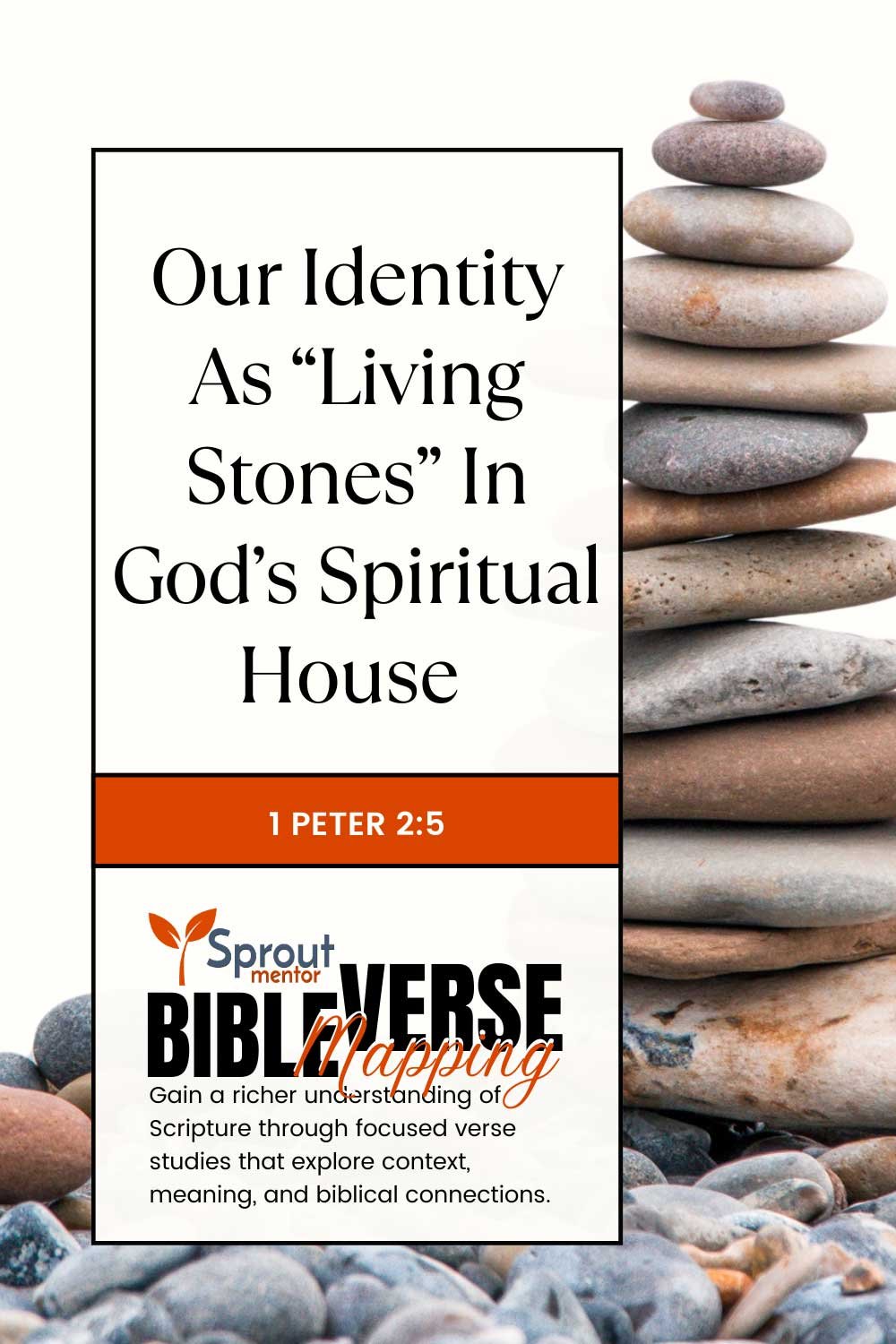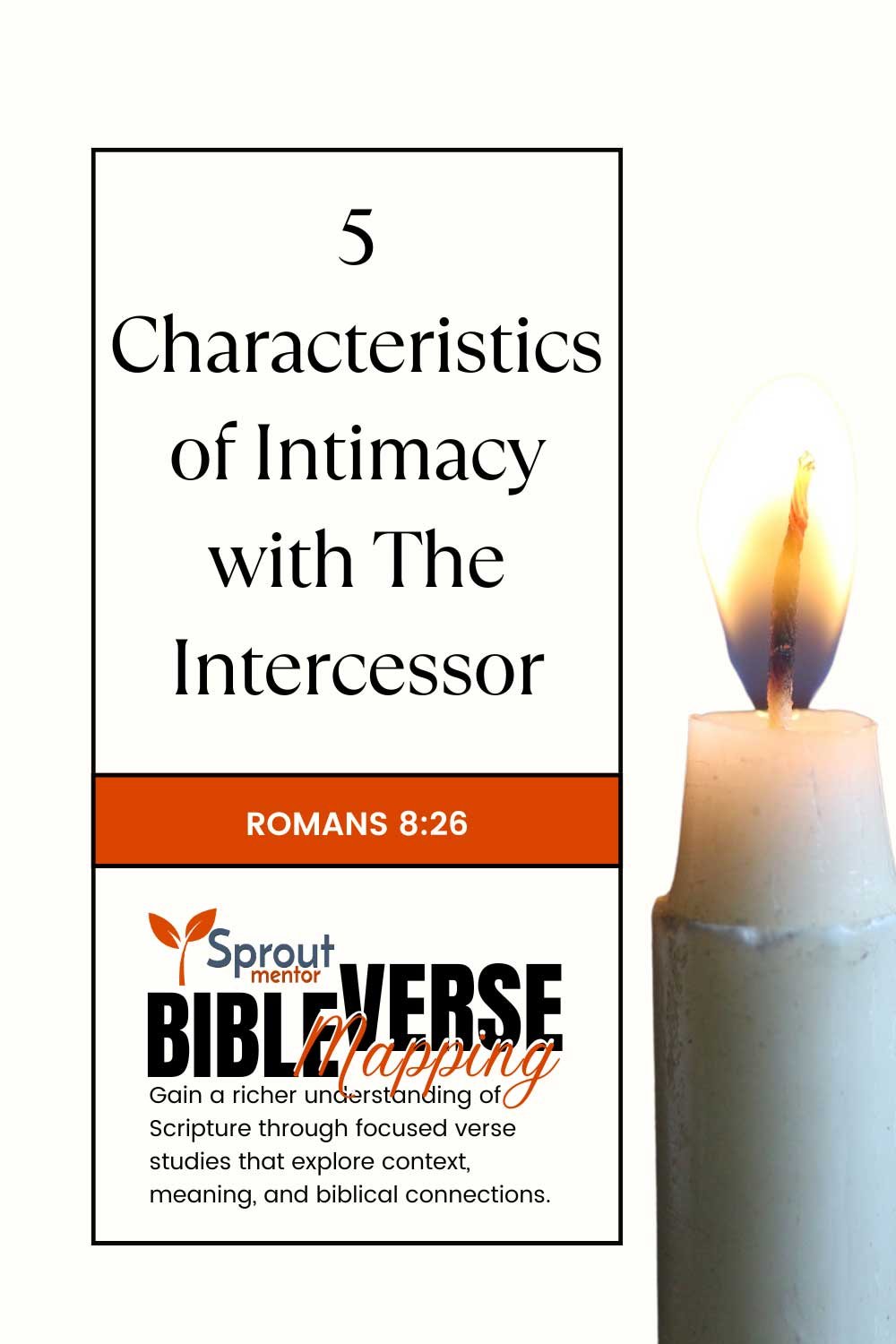Our Identity As “Living Stones” In God’s Spiritual House (1 Peter 2:5)

Share This Blog Post On:
Short on time, but big on faith? We break down complex topics into easy-to-understand chunks, making the Bible accessible to everyone. Join us for answers to your Bible questions and encouragement for your daily walk with God. Click here to grow your faith, one byte at a time!
“Ye also, as lively stones, are built up a spiritual house, an holy priesthood, to offer up spiritual sacrifices, acceptable to God by Jesus Christ.” (1 Peter 2:5, KJV)
As living stones, we are privileged to be part of God’s spiritual house—a place where His glory resides and His purposes are fulfilled. This post invites believers to explore 1 Peter 2:5, delving into its depths, connecting it with broader biblical themes, and unpacking its implications for our lives.
God’s Spiritual House
The Foundation
The foundation of God’s Spiritual house is Christ, the Cornerstone. “Behold, I lay in Zion a chief cornerstone, elect, precious: and he that believeth on him shall not be confounded.” (1 Peter 2:6, quoting Isaiah 28:16). In 1 Peter 2:5, the imagery of being “built up” begins with Christ as the foundation. Jesus is the cornerstone that sets the direction and stability for the entire structure. Without Him, the house collapses (Matthew 7:24-27). Believers, as “living stones,” are connected to Christ and each other, creating a cohesive, divinely designed building. This spiritual unity underscores that the Church is not just a gathering of individuals but a collective body where every part finds its meaning and purpose in Christ.
The Choice
In Genesis 12:8, Abram found himself between two locations—Bethel, meaning “House of God,” and Ai, a “pile of ruins” or unstructured stones. This geographical tension mirrors the spiritual choice believers face:
- Ai represents raw potential but lacks purpose. It’s a stockpile of individual stones that remain disconnected, unable to form a house.
- Bethel, by contrast, symbolizes God’s dwelling—a place where stones are shaped and fitted together to create a spiritual habitation.
Believers must migrate spiritually from Ai to Bethel. This process involves surrender, transformation, and a willingness to be shaped by the Master Builder. As living stones, we are not left in our raw, unshaped state. The chiseling and refinement we undergo are part of God’s work in fitting us into His grand design.
Our Identity As “Living Stones”
The Chiseling Process
Becoming a part of God’s house requires shaping. This shaping can be uncomfortable but is necessary for the unity and function of the spiritual house. Jesus Himself said: “Every branch in me that beareth not fruit he taketh away: and every branch that beareth fruit, he purgeth it, that it may bring forth more fruit.” (John 15:2). Similarly, living stones are cut, refined, and polished to fit into the structure. The Church is not a gathering of self-contained individuals asserting their uniqueness but a collective of believers willing to be transformed for the sake of the whole.
The Perfect Bride
Revelation 19:7-9 speaks of the Church as the bride of Christ, “arrayed in fine linen, clean and white.” This purity is the result of meticulous preparation. As living stones, we are being shaped and prepared to fit perfectly into God’s plan. This shaping ensures that the final structure—the spiritual house—is one that Christ Himself approves.
The Synagogue of Satan
If we resist God’s chiseling and cling to our unrefined shapes, the structure becomes a synagogue of Satan (Revelation 3:9), no longer reflecting God’s design. Jesus warned against those who claim to represent God but operate outside His will (Revelation 2:9). The true Church is one where each stone aligns with the cornerstone, creating a harmonious, God-honoring whole.
How to Embrace Our Identity as “Living Stones” in God’s Spiritual House In 4 Ways
#1 – Surrender to the Builder’s Process
To become living stones, we must allow God, the Master Builder, to shape us through His Word, His Spirit, and His people. This process requires humility, patience, and a willingness to grow. Transformation is often bittersweet—much like the bitter taste of chloroquine, a medicine that heals despite its unpleasant flavor. In the same way, God’s chiseling process can involve painful but necessary experiences. These include correction and discipline, as described in Hebrews 12:6-11, and the hard work of forgiveness and reconciliation, highlighted in Matthew 18:21-22. Furthermore, we are called to bear one another’s burdens, as Galatians 6:2 exhorts us.
The bitterness of transformation does not diminish the goodness of God’s spiritual house. Instead, it refines and strengthens it, much like iron sharpening iron (Proverbs 27:17). Through surrender to this process, we allow God to fit us perfectly into His divine structure.
#2 – Commit to Community
Isolation stunts spiritual growth and leaves us disconnected from God’s house. To fulfill our role as living stones, we must actively commit to a local church and participate in its life. This shift from individuality to community is beautifully illustrated in the story of Abram at Bethel. Just as individual stones come together to create a house, believers must unite to form the Church—a spiritual house where God’s presence resides. The Church is more than a gathering of individuals; it is a place of worship, covenant, and divine encounter.
Isolation is not God’s design for His people. Psalm 68:6 declares, “God sets the solitary in families; he brings out those who are bound into prosperity; but the rebellious dwell in a dry land” (ESV). The Church serves as a spiritual family where we find connection, encouragement, and purpose. Being part of God’s house aligns us with His blessings and protection, providing a fertile environment for spiritual growth. In contrast, rebellion and isolation lead to spiritual dryness and stagnation, much like a stone left alone in the wilderness—useless and exposed to the elements.
The story of Elimelech in Ruth 1:1-5 illustrates the consequences of straying from God’s house. During a famine in Bethlehem, the “house of bread,” Elimelech chose to leave God’s community for Moab, a place outside His covenant promises. This decision, though seemingly practical, led to tragedy for his family. Elimelech’s story reminds us of the dangers of abandoning God’s spiritual house for short-term solutions. By remaining connected to the Church, we stay rooted in the community where God’s provision and presence are found, ensuring that our lives remain aligned with His purposes.
#3 – Offer Spiritual Sacrifices
As living stones, we are called to offer spiritual sacrifices that please God. The Apostle Peter describes believers as a holy priesthood, offering sacrifices through Christ (1 Peter 2:5). These sacrifices include praise and worship (Hebrews 13:15), acts of goodness and generosity (Hebrews 13:16), and even offering our bodies as living sacrifices (Romans 12:1).
Unlike empty rituals, these sacrifices are heartfelt responses to God’s grace. They reflect our gratitude and devotion, and through Jesus Christ, they become acceptable to God. When we offer these spiritual sacrifices, we contribute to the collective worship of God, demonstrating His glory to the world.
#4 – Embrace Unity
Finally, embracing unity is essential to living out our identity as living stones. Unity fosters relationships, resolves conflicts, and enables believers to work toward the common purpose of glorifying God.
This corporate identity is vital because it invites God’s presence and power in ways unattainable by individuals alone. The Bible provides numerous examples of the power of unity. At Pentecost, the Holy Spirit descended when the disciples were gathered in one accord (Acts 2:1-4). Moses and the elders experienced prophecy and divine instruction in the context of community (Numbers 11:16-25). The Tabernacle and Temple symbolized God dwelling among His people (Exodus 40:34-38; 1 Kings 8:10-11).
Ephesians 2:19-22 reminds us that God’s fullness is experienced in the collective. When individual stones align and join together, they form His habitation—a spiritual house where His presence dwells. As believers, we must strive for unity, for where there is unity, God commands His blessing.
Psalm 133 illustrates the blessings of unity, describing how God commands both anointing and freshness where there is oneness among His people. The anointing is symbolized by the oil flowing from the head of Aaron down to his beard and garments. This flow signifies spiritual power and healing, as seen when the woman with the issue of blood was healed by touching the hem of Jesus’ garment (Matthew 9:20-22). Similarly, the aprons and handkerchiefs from Paul’s ministry carried healing and deliverance through the power of God (Acts 19:11-12). Unity creates a spiritual “gradient,” enabling the anointing to flow freely and accomplish God’s purposes.
Unity also brings freshness, represented by the dew of Mount Hermon. Just as dew provides life-giving moisture directly from its source, unity allows worship, songs, and sacrifices in the church to be inspired by the Holy Spirit. When our expressions of devotion originate from the Spirit, they are infused with a freshness and potency that glorifies God and transforms lives. This freshness revitalizes the body of Christ, empowering us to serve as His living stones, unified in purpose and mission.
Conclusion: Living Stones in the Hands of the Master Builder
1 Peter 2:5 is a call to transformation and unity. As living stones, we are part of something far greater than ourselves—a spiritual house where God dwells. The chiseling process may be painful, but the result is a glorious structure fit for the presence of God.
Let us choose to leave “Ai,” the pile of unstructured stones, and journey to “Bethel,” the house of God. As we yield to the Master Builder, we will find our place in His eternal plan, becoming a part of the holy priesthood that declares His glory to the world.
Continue Reading More On:
|







